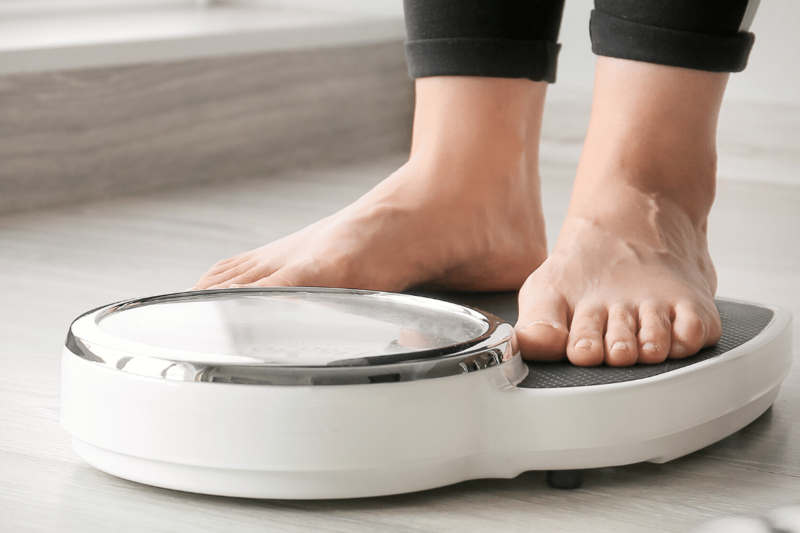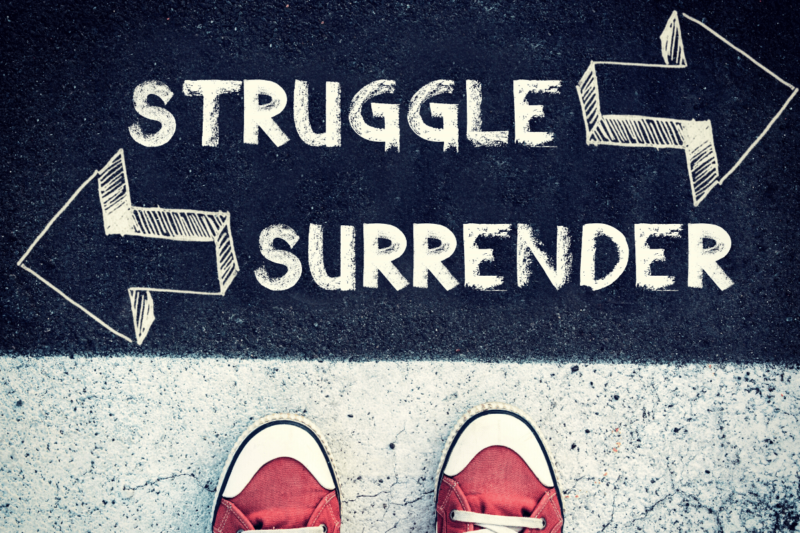
Why can it sometimes feel easier to just keep trying to lose weight than it is to accept your body as it is? Even when you know that years of dieting did little more than take up your time, money and energy, leaving you with a very fraught and conflicted relationship with food and worse body image than you had when you first tried to lose weight?
The desire to lose weight doesn’t just happen when you are actively dieting, or between diets and looking for the next “sure thing.” You can be exploring, even practicing, intuitive eating and size acceptance, and still want to lose weight.
This desire can be a constant, fairly quiet companion, or it can rise up out of seemingly nowhere with a vengeance. Possible triggers include:
- Comments from doctors
- A friend or family member’s “successful” weight loss
- Detailed talk by a friend or family member about their latest diet
- Not liking your reflection in a mirror, or your image in a photo
- Comments from friends, family, or partners about your body size
- Conflicted feelings about other appearance changes (such as post-pregnancy, or with aging)
- Difficulty shopping for clothes
- Events where you’ll be seeing people you haven’t seen for a while, and you’ve gained weight
- Vacations where you will be wearing a bathing suit or other revealing clothing
- Being in a body that makes it difficult to fit in airplane or theater seats
- Feeling judged or being harassed by other people because of your size
- Feeling out of shape or out of breath when being physically active
- Being a member of a marginalized group due to skin color, neurodivergence or physical impairment

The struggle is real
Refusing to adhere — or try to adhere — to the thin ideal as closely as possible can feel challenging. Refusing to comply — or try to comply — with the societal narrative that being healthy is dependent on reaching or maintaining a certain weight can feel even harder. Because even if you can’t change your body “enough,” the fact that you’re trying can help you feel aligned with the dominant culture.
So if you feel like trying to adhere, trying to comply, even though you know it hasn’t worked before and don’t really expect it to work again, there’s not something wrong with you. If you feel like you’re swimming upstream against the tide of dieters and articles touting the “miracle” of new weight loss medications, those feelings are real.
And if, as I mentioned earlier, you are a member of a marginalized group, then you are already moving through life visibly not adhering to our cultural norms (white, cisgender, heterosexual, able-bodied, neurotypical, and presenting in a way that signals sufficient income and education). Adding being fat to the mix may feel like standing out too much. It may not even feel safe. That sucks, and I’m sorry that we aren’t more respecting of diversity in this world.
But is it possible to survive and thrive in your here-and-now body? Can you move through life talking care of your body in ways that feel good without trying to change its size or appearance? Yes and yes. While it’s still a minority of people, more and more people are choosing to liberate themselves from rigid body standards, and are making peace with the fact that this path isn’t easy, and that big feelings will continue to arise.

Choosing the liberatory path
Going against the dominant narrative about body size is easier if you have people in your life — either in real life or online — who are on a similar journey of pushing back against unrealistic societal expectations about physical appearance and what it means to be “healthy.”
It doesn’t have to be a lot of people, often having just a few people who’ve got your back and who you can talk to about the tough stuff can inoculate you against the desire to jump back into the weight loss pool. Other things that can help:
- Expose your eye to a more diverse array of bodies. Just like shifting styles in clothing or home décor may look odd at first, you become used to them, and possibly even start to like them. Although diversity in bodies (size, skin color, age) is improving slightly in media and advertising, we still see mostly thin bodies. Seek out movies, shows, and clothing websites/catalogs (Universal Standard is particularly good) that are more representative of body diversity. Unfollow social media accounts that promote unrealistic standards for health or body size, and replace them with accounts that promote living a vibrant life in bodies that aren’t “typical.”
- Wear clothes that feel good ON your body. Choose clothes that fit, whether you prefer skimming or flowing. Choose fabrics that please your skin, and, sure, colors that please your eye. Basically, please yourself.
- Read, read, read. Read books by fat authors, and by fat black authors, who have a lot to say about the oppressiveness of body standards. Your feelings about your body are personal, but they are also directly influenced by a larger system. Once you see the system for what it is, you have a more appropriate place to direct your anger. Get mad at the system, not your body.
- Explore how your body size is tied to your identity. This may be particularly relevant if you used to “naturally” be in a smaller body and were praised for your thinness. It also may be key if now that you are not thin, you realize that being in a thin body carried a lot of privilege. Is your body really WHO you are? Do you need time to grieve the body you once had?
- Untangle yourself from black-or-white thinking. Giving up the pursuit of weight loss and divesting from unrealistic body ideals isn’t a journey with a set finish line. There will be days where you feel truly free, and days when you feel yourself getting sucked back in. There will be days when you like your body, and days when you don’t. I really feel that having a mindful self-compassion practice helps weather the storms that come up. When you can acknowledge your suffering when things feel hard, but continue to act in alignment with what’s truly important to you, you feel less stuck.

A semi-short reading list
“The Mindful Path to Self-Compassion: Freeing Yourself from Destructive Thoughts and Emotions” by Christopher Germer
“The Mindful Self-Compassion Workbook: A Proven Way to Accept Yourself, Build Inner Strength, and Thrive” by Kristen Neff and Christopher Germer
“The Happiness Trap: How to Stop Struggling and Start Living” by Russ Harris
“Reclaiming Body Trust: A Path to Healing & Liberation” by Hilary Kinavey and Dana Sturtevant
“More Than A Body: Your Body Is an Instrument, Not an Ornament” by Lindsay and Lexie Kite
“What We Don’t Talk About When We Talk About Fat” by Aubrey Gordon
“You Just Need to Lose Weight (and 19 Other Myths About Fat People” by Aubrey Gordon
“Landwhale: On Turning Insults Into Nicknames, Why Body Image Is Hard, and How Diets Can Kiss My Ass” by Jes Baker
“Fearing the Black Body: The Racial Origins of Fat Phobia” by Sabrina Strings
“Belly of the Beast: The Politics of Anti-Fatness as Anti-Blackness” by Da’Shaun L. Harrison
“The Body Is Not an Apology: The Power of Radical Self-Love” by Sonya Renee Taylor
“Your Body Is Not an Apology Workbook: Tools for Living Radical Self-Love” by Sonya Renee Taylor
“The Body Liberation Project: How Understanding Racism and Diet Culture Helps Cultivate Joy and Build Collective Freedom” by Chrissy King
“It’s Always Been Ours: Rewriting the Story of Black Women’s Bodies” by Jessica Wilson
“Fat Girls in Black Bodies: Creating Communities of Our Own” by Joy Cox
This post contains Amazon Affiliate links. As an Amazon Associate I earn from qualifying purchases.
Disclaimer: All information provided here is of a general nature and is furnished only for educational purposes. This information is not to be taken as medical or other health advice pertaining to an individual’s specific health or medical condition. You agree that the use of this information is at your own risk.
Hi, I’m Carrie Dennett, MPH, RDN, a weight-inclusive registered dietitian, nutrition therapist and body image counselor. I offer compassionate, individualized care for adults of all ages, shapes, sizes and genders who want to break free from eating disorders, disordered eating or chronic dieting. If you need to learn how to manage IBS symptoms with food, or improve your nutrition and lifestyle habits to help manage a current health concern or simply support your overall health and well-being, I help people with that, too.
Need 1-on-1 help for your nutrition, eating, or body image concerns? Schedule a free 20-minute Discovery Call to talk about how I can help you and explore if we’re a good fit! I’m in-network with Regence BCBS, FirstChoice Health and Providence Health Plan, and can bill Blue Cross and/or Blue Shield insurances in many states. If I don’t take your insurance, I can help you seek reimbursement on your own. To learn more, explore my insurance and services areas page.
 Print This Post
Print This Post






